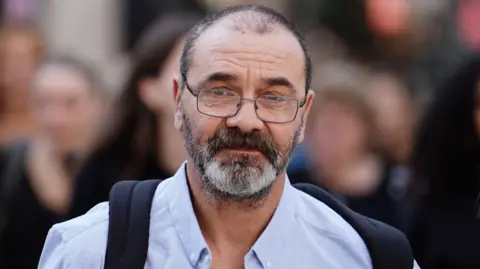Other prisoners could be freed by case reviews

 PA
PAAndrew Malkinson says he says he knows “at least half a dozen people” currently in prison who he believes could be exonerated if their cases were reviewed.
Speaking to the BBC, Mr Malkinson – who served 17 years in prison for a rape he did not commit – described the failures in the process for reviewing potential miscarriages of justice as a “human rights atrocity”.
His comments come following the publication of an independent review that found he was completely failed by the Criminal Cases Review Commission (CCRC) – and mounting pressure on its head to quit.
The review’s author, Chris Henley KC, has backed calls for a “trawl” for similar cases, weeks after the agency admitted it needs to review thousands of files.
The damning report into how Mr Malkinson’s case was handled, which was published on Thursday, concluded he could have been freed five years after receiving a life sentence for a 2003 rape.
It revealed the CCRC’s investigators and leaders failed to follow up evidence of innocence right up to 2022.
“It’s absolutely shocking what Chris Henley has uncovered,” Mr Malkinson told BBC Radio 4’s Today programme.
“It’s vast incompetence at the very least… and I don’t know what it’s like at worst”, he said.
“It seems they [the CCRC] devote all their time and resources to finding ‘clever me’ arguments about why they shouldn’t refer, rather than looking at the police files and really investigating.”
Chair faces drawn-out sacking process
 PA
PAHis comments come after Justice Secretary Shabana Mahmood said she would seek the sacking of CCRC chair Helen Pitcher, saying she was “unable to fulfil her duties”.
The BBC understands that Ms Mahmood’s Conservative predecessor, Alex Chalk, had reached a similar conclusion on the eve of the General Election, having read Mr Henley’s findings.
Ms Pitcher has told the Ministry of Justice she will not quit. Ministers cannot directly sack her, because the CCRC is an independent part of the legal system, so a panel needs to be convened to ensure the decision is independently taken.
On Friday, former Justice Secretary Lord Falconer called on Ms Pitcher to resign not just from that role but from her other position as the head of the the Judicial Appointments Commission (JAC) – the body that appoints all judges in England and Wales.
Mr Falconer said Ms Pitcher should never have been appointed to both roles at the same time, as the CCRC’s work includes challenging judge’s decisions.
“She should go as quickly as possible, because the one thing you need is confidence in our judges and confidence in the safety nets,” he said.
Ms Pitcher apologised in a statement accompanying Mr Henley’s report, saying that it was clear from “that the Commission failed Mr Malkinson”.
She has refused previous BBC invitations for an interview, saying via her officials that she needed to wait for the publication of the Henley report. On Thursday she was unavailable for a broadcast interview for personal reasons.
Mr Malkinson said the apology had come “far, far too late”.
“It seems to me very strongly that this is the most reluctant apology, when all avenues have been explored for her [Ms Pitcher] to seek a positive outcome,” he said.
“The fact that they left me languishing in jail with careless abandon, it’s infuriating – deeply, profoundly infuriating.”
Review commissioned
In his report, Chris Henley details how both CCRC case workers and leaders failed to do their job – and he criticised Ms Pitcher’s public statements for taking some of the credit for Mr Malkinson’s exoneration, when all the work was done by his legal team.
He told Today that it would be “far too complacent” to say that what had happened to Mr Malkinson was an “outlying aberration”.
“There must be other cases where there are fresh opportunities for retesting DNA samples and that should be undertaken as a matter of urgency.”
The CCRC says that it wants to review up to 5,500 closed cases in which DNA was an element in convictions of people for the most serious crimes.
The decision was taken weeks after Mr Malkinson’s exoneration a year ago – but not was not revealed until April of this year.
The agency’s internal estimates suggest that dozens of the cases may need to be fully re-investigated – but it needs more cash from the government to carry out the work.





